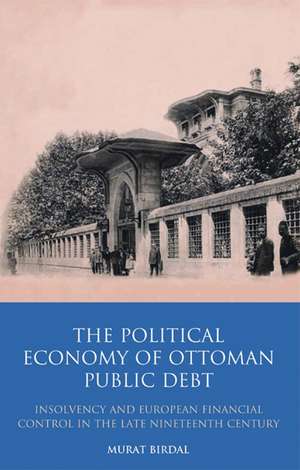The Political Economy of Ottoman Public Debt: Insolvency and European Financial Control in the Late Nineteenth Century
Autor Murat Birdalen Limba Engleză Hardback – 6 apr 2010
Preț: 713.72 lei
Preț vechi: 1027.19 lei
-31% Nou
Puncte Express: 1071
Preț estimativ în valută:
136.56€ • 143.35$ • 113.36£
136.56€ • 143.35$ • 113.36£
Carte tipărită la comandă
Livrare economică 11-25 aprilie
Preluare comenzi: 021 569.72.76
Specificații
ISBN-13: 9781848852983
ISBN-10: 1848852983
Pagini: 256
Ilustrații: 7 integrated bw illustrations
Dimensiuni: 138 x 216 x 25 mm
Greutate: 0.43 kg
Ediția:New.
Editura: Bloomsbury Publishing
Colecția I.B.Tauris
Locul publicării:London, United Kingdom
ISBN-10: 1848852983
Pagini: 256
Ilustrații: 7 integrated bw illustrations
Dimensiuni: 138 x 216 x 25 mm
Greutate: 0.43 kg
Ediția:New.
Editura: Bloomsbury Publishing
Colecția I.B.Tauris
Locul publicării:London, United Kingdom
Notă biografică
Murat Birdal is Assistant Professor in the Department of Economics at Istanbul University. He received his PhD from University of Southern California in 2006.
Cuprins
Chapter 1: Introduction 1.1. Theoretical Background 1.2. The Ottoman Public Debt Administration (OPDA)1.3. Peripheralization of the Ottoman Empire in the Nineteenth Century and the Role of the Ottoman Public Debt Administration1.4. Organization of the DissertationChapter 2: Ottoman Borrowing in the Pre-OPDA Period: The Path to the Decree of Muharrem2.1. Crisis of the Ottoman Finance and Reform Attempts2.2. Domestic Borrowing and the Financial Monopoly of the Galata Bankers 2.3. External Borrowing and the Institutional Reforms to Improve the Credit of the Empire:1854-18752.4. Ottoman Borrowing During the Default Period: 1875-1881 2.5. Ottoman Debt Settlement and the Decree of Muharrem Chapter 3: Coordination, Commitment and Enforcement: Making Sense of the Ottoman Public Debt Administration3.1. Debtor's Dilemma and Mechanisms for Compliance3.2. Enforcement Mechanisms for Sovereign Compliance 3.3. Analytical Framework: Debtor's Dilemma Reconsidered3.4. Implications of the Model3.5. Enforcement of Debt Contracts Before the OPDA: Understanding the Role of the CFB 3.6. Enforcement of Debt Contracts After the OPDA3.7. Ottoman Foreign Borrowing in the OPDA Era 3.8. Foreign Direct Investment after the Decree of Muharrem3.9. The OPDA's Role in Foreign Investment in the Ottoman Empire Chapter 4: Organizational Structure of the OPDA and the Administration of the Indirect Revenues4.1. Organizational Structure of the OPDA4.2. Administration of the Five Indirect Contributions under the OPDA4.3. An Assessment of the OPDA's Economic Performance Chapter 5: Tobacco Sector and the Régie Company5.1. History of Tobacco in the Ottoman Empire5.2. Administration of the Tobacco Revenues Before the Régie System 5.3. Establishment of the Régie Company5.4. Organization of the Régie System 5.5. Economic Performance of the Régie Company5.6. An Assessment of the Régie System Chapter 6: The Role of the OPDA in the Transformation of the Ottoman Economy 6.1. Summary 6.2. The OPDA's Role in Risk Reduction6.3. The Dual Role of the OPDA6.4. Absence of Reforms in the Ottoman Empire6.5. Foreign Archives and the OPDA as Sources of Historical Information 6.6. Further Research

















